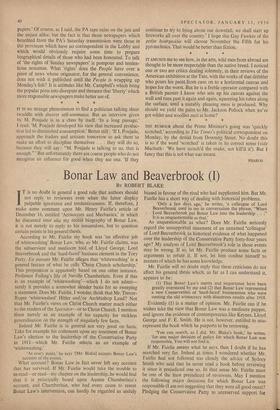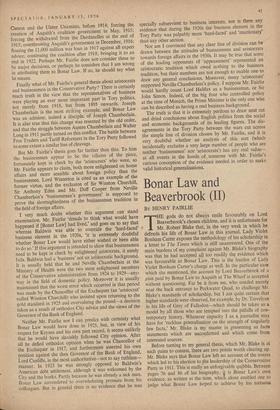Bonar Law and Beaverbrook (I)
BY ROBERT BLAKE IT is no doubt in general a good rule that authors should not reply to reviewers even when the latter display palpable ignorance and tendentiousness. If, therefore, I make some comment upon Mr. Henry Fairlie's article of December 16, entitled 'Aristocrats and Mechanics,' in which he discussed inter alit: my recent biography of Bonar Law, it is not merely to reply to his innuendoes, but to question certain points in his general thesis. According to Mr. Fairlie my book was 'an effective job of whitewashing' Bonar Law, who, so Mr. Fairlie claims, was the subservient and mediocre tool. of Lloyd George, Lord Beaverbrook and the 'hard-faced' business element in the Tory Party. En passant Mr. Fairlie alleges that 'whitewashing' is a general feature of what he calls 'Christ Church scholarship.'. This proposition is apparently based on one other instance, Professor Feiling's life of Neville Chamberlain. Even if this is an example of 'whitewashing'—which I do not admit— surely it provides a somewhat slender basis for so sweeping a statement. Does Mr. Fairlie, I wonder, think that Mr. Trevor- Roper 'whitewashed' Hitler and/or Archbishop Laud? Not that Mr. Fairlie's views on Christ Church matter much either to the readers of the Spectator—or to Christ Church. I mention them merely as an example of his capacity for reckless generalisation on the strength of singularly few facts.
Indeed Mr. Fairlie is in general not very good on facts.
Take for example his comments upon my treatment of Bonar Law's election to the leadership of the Conservative Party in 1911—which Mr. Fairlie selects as an example of 'whitewashing.'
'.At every point,' he says `[Mr. Blake] accepts Bonar Law's account of the events.'
What account? Bonar Law in fact never left any account that has survived. If Mr. Fairlie would take the trouble to re-read—or read—my chapter on the leadership, he would find that it is principally based upon Austen Chamberlain's account, and Chamberlain, who had every cause to resent Bonar Law's intervention, can hardly be regarded as unduly biased in favour of the rival who had supplanted him. But Mr. Fairlie has a short way of dealing with historiCal problems. 'Only a few days ago,' he writes, 'a colleague of Lord Beaverbrook used to me in conversation the phrase, "When Lord Beaverbrook put Bonar Law into the leadership . ." It is as unquestionable as that.'
As unquestionable as what? Does Mr. Fairlie seriously regard the unsupported statement of an unnamed 'colleague' of Lord' Beaverbrook as historical evidence of what happened over the leadership of the Conservative Party forty-four years ago? My analysis of Lord Beaverbrook's role in those events may be wrong. If so, let Mr. Fairlie produce some facts or arguments to refute it. If not, let him confine himself to matters of which he has some knowledge.
Mr. Fairlie will no doubt reply that these criticisms do not affect his general thesis which, as far as I can understand it, appears to be : (I) That Bonar Law's merits and importance have been greatly overstated by me and (2) that Bonar Law represented a new Conservatism of 'hard-faced' businessmen who were ousting the old aristocracy with disastrous results after 1918. Evidently (1) is a matter of opinion. Mr. Fairlie can if he wishes take the view that Bonar Law was a mediocre puppet, and ignore the evidence of contemporaries like Keynes, Lloyd George and F. E. Smith. He is not, however, entitled to mis- represent the book which he purports to be reviewing.
'You can search, as I did, Mr. Blake's book,' he writes, 'for one major decision of policy for which Bonar Law was responsible. You will not find it.'
If Mr. Fairlie means what he says, then I doubt if he has searched very far. Indeed at times I wondered whether Mr. Fairlie had not followed too closely the advice of Sydney Smith who said that he never read a book before reviewing it since it prejudiced one so. In that sense Mr. Fairlie must be one of the least prejudiced of reviewers. May I mention the, following major decisions for which Bonar Law was responsible (I am not suggesting that they were all good ones)? Pledging the Conservative Party to unreserved support for, Carson and the Ulster Unionists, before 1914; forcing the creation of Asquith's coalition government in May, 1915; forcing the withdrawal from the Dardanelles at the end of 1915; overthrowing Asquith's government in December, 1916; floating the £1,000 million war loan in 1917 against all expert advice; continuing the coalition after 1918; bringing it to an end in 1922. Perhaps. Mr. Fairlie does not consider these to be major decisions, or perhaps he considers that I am wrong in attributing them to Bonar Law. If so, he should say what he means.
Finally what of Mr. Fairlie's general thesis about aristocrats and businessmen in the Conservative Party? There is certainly much truth in the view that the representatives of business were playing an ever more important part in Tory politics, not merely from 1918, but from 1895 onwards. Joseph Chamberlain is the most striking example, and Bonar Law was an admirer, indeed a disciple, of Joseph Chamberlain. It is also true that this change was resented by the old order, and that the struggle between Austen Chamberlain and Walter Long in 1911 partly turned on this conflict. The battle between Free Traders and Tariff Reformers in the Tory Party followed to some extent a similar line of cleavage.
But Mr. Fairlie's thesis goes far farther than this. To him the businessmen appear to be the villains of the piece, fortunately kept in check by the 'aristocrats' who were, so Mr. Fairlie appears to claim, both more enlightened on home affairs and more sensible about foreign policy than the businessmen. Lord Winterton is cited as an example of the former virtue, and the exclusion of Sir Winston Churchill, Sir Anthony Eden and Mr. Duff Cooper from Neville Chamberlain's 'businessman's government' is supposed to prove the shortsightedness of the businessman tradition in the field of foreign affairs.
I very much doubt whether this argument can stand examination. Mr. Fairlie 'dreads to think what would have happened if [Bonar Law] had lived,' and goes on to say that whereas Baldwin was able to override the 'hard-faced' business element in the 1920s, 'it is extremely doubtful whether Bonar Law would have either wished or been able to do so.' If this argument is intended to show that businessmen need to be kept in check by enlightened aristocrats, it surely fails. Baldwin had a 'business' not an aristocratic background. It is usually held that he and Neville Chamberlain at the Ministry of Health were the two most enlightened members of the Conservative administration from 1924 to 1929—any- way in the field of domestic policy. Moreover it is usually maintained that the worst error which occurred in that period was. made by the Chancellor of the Exchequer (an 'aristocrat' called Winston Churchill) who insisted upon returning to the gold standard in 1925 and overvaluing the pound--,--a decision taken as a result of orthodox City advice and the views of the Governor of the Bank of England.
Neither Mr. Fairlie nor I can predict with certainty what Bonar Law would have done in 1925, but, in view of his respect for Keynes and his own past record, it seems unlikely that he would have slavishly followed City opinion. After all he defied orthodox opinion when he was Chancellor of the Exchequer in 1917, and furthermore asserted his own position against the then Governor of the Bank of England, Lord Cunliffe, in the most authoritative—not to say ruthless-- manner. In 1923 he was strongly opposed to Baldwin's American debt settlement, although it was welcomed by the City and the banks. Partly because he was already a sick man, Bonar Law surrendered to overwhelming pressure from his colleagues. But in general there is no evidence that he was specially subservient to business interests, nor is there any evidence that during the 1920s the business element in the Tory Party was palpably more 'hard-faced' and 'reactionary' than any other section.
Nor am I convinced that any clear line of division can be drawn between the attitudes of businessmen and aristocrats towards foreign affairs in the 1930s. It may be true that some of the leading opponents of 'appeasement' represented an aristocratic tradition which owed nothing to the business tradition, but their numbers are not enough to enable one to draw any general conclusions. Moreover, many `aristocrats' supported Neville Chamberlain's policy. I suppose Mr. Fairlie would hardly count Lord Halifax as a businessman, or Sir John Simon. Indeed, of the big four who controlled policy at the time of Munich, the Prime Minister is the only one who can be described as having a real business background.
The truth is that it is extremely perilous to draw neat cut and dried conclusions about English politics from the social and economic backgrounds of its leading figures. The dis- agreements in the Tory Party between the wars cut across the simple line of division chosen by Mr. Fairlie, and it is very doubtful whether an analysis of this sort (which incidentally excludes a very large number of people who are neither 'businessmen' nor 'aristocrats') has any real value— at all events in the hands of someone with Mr. .Fairlie's curious conception of the evidence needed in order to make valid historical generalisations.



































 Previous page
Previous page